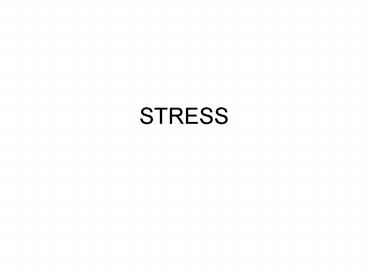STRESS PowerPoint PPT Presentation
1 / 21
Title: STRESS
1
STRESS
2
Stress
- Stress
- Process by which environmental events threaten or
challenge an organisms well-being and by which
that organism responds to this threat - Stressors
- Environmental events that pose threats or
challenge
3
Stress
- Stress is the process by which environmental
events (stressors) - challenge or threaten us
- how these threats are interpreted
- how they make us feel
- How we respond and adjust to them
4
Stress
- Stressors
- Usually external
- Major disasters/traumas
- Not always external
- Symbols of threat
- Reminders of past harm
- Other psychological representations of danger
5
Stress
- The weaker the threat demand or loss is, the
greater is the variation in whether people view
the event as stressful - Response during and after exposure to stressors
may be - Physiological
- Behavioral
- Cognitive
- Emotional
- Combination of these
6
Stress
- Stress increases the bodys preparedness
- This increased arousal is linked with cognitive
variables that will influence the likelihood of a
negative or a positive outcome - Appraisal
- Coping
7
Stress
- Cannon (1914)
- First to use the term stress
- Recognized both physiological and psychological
properties - When a threat is perceived, stress creates enough
arousal for fight or flight
8
Stress
- Hans Selye (1956)
- Universal Triad
- Adrenal glands
- Thymus glands
- Gastrointestinal lining
- General Adaptation Syndrome
- Alarm
- Resistance
- Exhaustion
- Nonspecific
9
The three stages of Selyes General Adaptation
Syndrome and their consequences
Resistance If the stressor continues, the body
mobilizes to withstand the stress and return to
normal
Exhaustion Ongoing, extreme stressors eventually
deplete the bodys resources so we function at
less than normal
Alarm The body initially responds to a stressor
with changes that lower resistance
Return to homeostasis
Stressor The stressor may be threatening or
exhilarating
Homeostasis The body systems maintain a stable
and consistent (balanced) state.
Illness
Death
Illness and death The bodys resources are not
replenished and/or additional stressors occur
the body suffers breakdowns.
10
Stress
- Mason (1975)
- Reported different patterns of stress hormones
associated with various stressors - Psychological distress
- precedes adrenal response
- May be necessary for a physiological reaction to
occur - Awareness
- Coma vs conscious patients
- Enlarged adrenal glands
- Survivors of a fire
- PTSD
11
Stress
- Frankenhaueser (1972)
- Increases in E and NE
- Correlated with decreased control over electric
shock
12
Stress
- Patkai (1971)
- One session
- Played a modified game of chance (modified bingo
game somewhat pleasant) - One session
- Viewed gruesome surgery films
- One session
- Unpleasant, tedious tasks were performed
- One session
- Neutral inactivity
- Results
- E and NE were highest in bingo game
- Second highest film condition
13
Stress
- Selye vs Lazarus
- Measurement of stress versus measurement of a
stressor
14
Stress
- Lazarus (1966)
- Emphasized perception and appraisal
- Unless we perceive a situation as threatening, we
will not experience stress
15
Stress
- Appraisal
- Lazarus (1965)
- Subjects viewed one of two gruesome films
- Worker cutting off his finger in a woodshop
accident - Worker being killed by a a wooden plank driven
through his body - Were then told that neither event was real and
was for safety purposes - Subjects saw films without explanation
- Results
16
Stress
- Lazarus Folkman (1984)
- Defined psychological stress as a particular
relationship between the environment that is
appraised by the person as taxing or exceeding
his or her resources and engendering his or her
well-being - Transactional view of stress
- Key to the transaction is how one perceives the
situation - Situation must be seen as threatening or
challenging or harmful
17
Stress
- Appraisal
- Primary Appraisal
- When one first encounters an event, the person
appraises it in terms of its effect on his/her
wellbeing - Person may view the event as irrelevant, benign,
positive or stressful - Harm psychological damage that has already been
done (e.g., illness, injury) - Threat anticipation of harm
- Challenge persons confidence in overcoming
difficult demands
18
Stress
- Appraisal
- Secondary Appraisal
- After ones initial appraisal of an event, one
evaluates ones resources to cope with harm,
threat, or challenge - what options are available to me?
- What is the likelihood that I can successfully
apply the necessary strategies to reduce this
stress
19
Stress
- Appraisal
- Reappraisal
- Appraisal change constantly as new information
becomes available
20
Stress as a Psychophysiological Process
appraisal processes
potential stressors
events perceived as benign
environmental and social context
Reappraisal, palliation seeking information
events perceived as threatening, harmful, or
challenging
manipulation of Stressor or context
coping
aftereffects
wear and tear
21
pituitary gland
Stressors
ACTH
- Secretion of
- Corticosteroids
- Increased protein and
- fat mobilization
- Increased access to
- energy storage
- Decreased inflammation
Sympathetic nervous system
Cortex Adrenal glands Medulla
Secretion of epinephrine and norepinephrine
Increases cardiovascular response, respiration,
perspiration, blood flow to active muscles,
muscle strength, and mental activity

